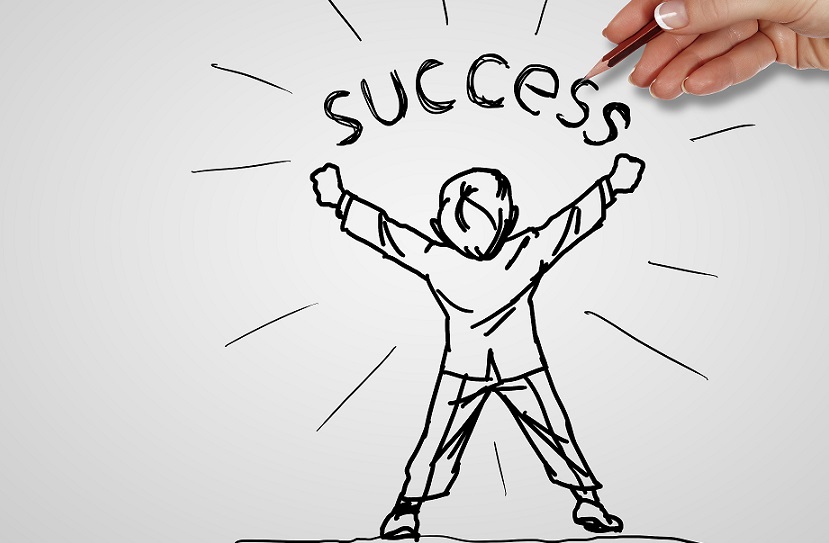6 ways to really reach your goals


Some of what we’ve just accepted, or read in the self-help books, checks out. Much of it doesn’t. Here’s my selection of what does – my top six. Read them and have the best year – ever.
1. Choose to be the captain of your ship
It’s the biggie. Contrast being the captain of your ship with being the ship, wallowing in the sea. Treat taking charge of our own lives, as a choice. It can be a very demanding discipline, but it’s fundamental.
Even if we can’t control events in our lives, we can control our attitude to them. Are you a victim or survivor?
2. Work on your willpower
It’s all about glucose.
Glucose is your brain’s fuel and anything that reduces your glucose reduces your willpower. Sure, determination is helpful, but the research shows that being obsessed about a goal is not an effective strategy. Deciding that we will feel worthy or happy when we reach our goals doesn’t help either. Maintaining our glucose levels does.
If your brain is working to keep you on your diet or exercise plan, it is guzzling glucose. Anything that keeps your glucose levels up maintains your willpower. A healthy diet helps, obviously, but so does adequate sleep and regular exercise.
Some simple strategies can help us maintain our stores of precious glucose.
We can schedule difficult decisions for times when we are well fed and rested.
We can turn off the icon that tells us a tempting email has just arrived.
If we are working towards a goal we can take the ‘will I/won’t I?’ decision out of the picture. Exercise? Lay out your gym gear on the floor so you can’t miss it and place the alarm clock too far away to reach from the bed.
3. Develop systems, not just goals
Goals are good. Systems are better.
Top achievers focus on steps towards goals. Make the action relentless and you have a system.
Losing 10 kilograms is a goal. Maintaining our diet and going to the gym on Mondays, Wednesdays and Fridays, even when we don’t feel like it, is a system. The picture of the yacht on the fridge without an action plan to achieve it isn’t even a goal. It’s a fantasy.
4. Adopt a growth mindset
Don’t think of mindset as just being positive or negative.
Carol Dweck, professor of psychology at Stanford University, has been studying mindsets for many years and her findings are critical if we really want to make this our best year ever.
If you have a growth mindset, you see life as a series of opportunities to learn. You might be upset when you have a setback, but you see setbacks as inevitable and believe they don’t define you.
People with a fixed mindset believe that we are either talented or we are not. Failure is a threat to their identity as a talented person. So is practice, because talented people don’t need to practise. The results? Fixed mindsetters don’t develop their skills. They’re reluctant to take on big challenges. They can be crushed by setbacks.
A growth mindset is a choice. We can choose to make it a focus, welcome new challenges, enjoy the opportunity to learn from setbacks and ignore what other people may think.
5. Develop some healthy pessimism
Optimism has a dark side.
It’s good to have a sense of hope or confidence that we’ll achieve our goals, but too much optimism makes goal-seekers less resilient. They can be shattered when they encounter setbacks.
Balance your general sense of hope that you can succeed with some healthy pessimism.
An example?
Researchers report a study of women who were not exercising but knew they should. Half the women were reminded of the benefits of exercise. The other half were asked to imagine what might stop them working towards their goal of regular exercise. That’s the pessimism. Here’s the really important bit: They were then asked to come up with a strategy if they found themselves thinking, ‘I’m too busy today’ or, ‘I’m under too much stress – I’ll do it tomorrow’. Four months later, the women who had applied some pessimism, then come up with a strategy were doing twice as much exercise as the control group.
6. Develop self-compassion
You won’t read this one in a standard self-help book.
Okay, it does seem like a tree-huggy soft option, but here it is: When you fail to keep to your action plan, talk to yourself like a compassionate friend, accepting the lapse without judgement and encouraging you to get back on track. The researchers have shown that it’s a far more effective strategy than self-criticism, guilt or shame. You can use self-compassion with any goal.
Two researchers asked women on a diet to choose a doughnut to eat (making them complicit in the lapse from their goal to lose weight). They gave half the women a compassionate message: ‘Everyone indulges sometimes…I don’t think there’s any reason to feel bad about it’. They then invited all the women to ‘taste-test’ some candy. Those who had heard the compassionate message ate far fewer candies than those who hadn’t.
Why use up good brain fuel with self-criticism, guilt or shame? Accept the lapse and insist that you get back on track. There’s nothing soft about that.
When you read what the researchers come up with it’s easy to think, ‘It’s just common sense. I knew that’. That’s the trap.
Few people can list the proven techniques if you ask them. Fewer still are making the best use of them – making them a focus of their lives, taking every opportunity to put them into action.
About the author: Ralph Brown is a speaker, trainer and writer on the science of success. His training company, Skillset New Zealand, specialises in the skills that make people more effective at work. Read his eBook “The Village That Could” on bookboon.com.




